Top References Discussed in Biblical Theologies
An earlier post discussed how systematic theologies use the Bible to discuss the classic topics of systematic theology. We looked at the most frequent references found in contexts discussing the primary topics of systematic theology. It was a popular post at theLAB, and Christianity Today even interacted with us by asking several prominent theologians what they thought about the results.
It’s no surprise that theologians were disappointed at the lack of interaction with the Old Testament. Two commenters, Kevin Vanhoozer and Michael Allen, noted dismay specifically that Exodus 34:6–7 is not included in the top 100 list. My guess is that Vanhoozer and Allen (as well as Craig Keener, John Stackhouse, Michael Bird, William Dyrness, and others) will be pleasantly surprised with the reference data from Biblical theologies.
Biblical theologies are a slightly different class of theology resource that more directly associate the biblical witness with theological insight and conclusions.
As was done with systematic theologies, Faithlife has analyzed Bible reference citations in Biblical theology resources, and categorized the context of citation with the classic systematic theological categories.
Classic Systematic Theology Categories
- Theology Proper: The study of the being, attributes, and works of God
- Bibliology: The study of the Bible
- Christology: The study of Christ
- Pneumatology: The study of the Holy Spirit
- Soteriology: The study of salvation
- Anthropology: The study of humanity
- Angelology: The study of angels
- Demonology: The study of demons
- Hamartiology: The study of sin
- Ecclesiology: The study of the church
- Eschatology: The study of the last things
 As with the systematic theologies, the Biblical theologies were further categorized according to a resource grouping, but it wasn’t by denominational group. While some Biblical theologies interact with the whole Bible, many focus on particular areas, such as Old Testament, New Testament, Johannine Literature, Lukan Literature, Psalms, and the like. So we used resource groupings based on corpus or sub-corpus of the Bible. We also included “Reference” and “Thematic” groupings.
As with the systematic theologies, the Biblical theologies were further categorized according to a resource grouping, but it wasn’t by denominational group. While some Biblical theologies interact with the whole Bible, many focus on particular areas, such as Old Testament, New Testament, Johannine Literature, Lukan Literature, Psalms, and the like. So we used resource groupings based on corpus or sub-corpus of the Bible. We also included “Reference” and “Thematic” groupings.
Each resource had its group categorized. This means that, starting from a Bible reference, one can examine the use of the reference in Biblical theologies by topic and resource grouping. At the time of this post, over 670,000 references in nearly 200 Biblical theology resources have been categorized.
The earlier post on systematic theologies examined how references were used and classified in systematic theologies. Let’s do this again, only for Biblical theologies, and compare and contrast with the systematic theologies classifications along the way.
First, here are the top 10 most frequently cited references in Biblical theologies:
- John 1:14 (796x)
- Genesis 12:3 (785x)
- Genesis 1:28 (751x)
- Jeremiah 31:33 (703x)
- Jeremiah 31:34 (628x)
- Exodus 34:6 (579x)
- Genesis 12:2 (577x)
- Galatians 2:20 (571x)
- Genesis 1:26 (560x)
- Romans 3:25 (550x)
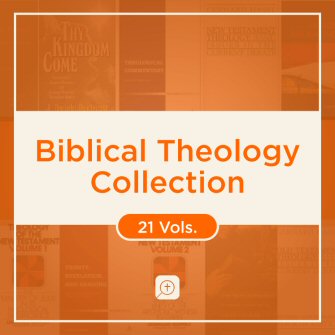 What is immediately striking to me is the frequency of Old Testament references. Systematic theologies had nine OT references in the top 100. In Biblical theologies, seven of the top ten references are from the Old Testament, and 29 of the top 100. Systematic theologies had no Galatians references in the top 100; Biblical theologies have Galatians 2:20 at spot eight.
What is immediately striking to me is the frequency of Old Testament references. Systematic theologies had nine OT references in the top 100. In Biblical theologies, seven of the top ten references are from the Old Testament, and 29 of the top 100. Systematic theologies had no Galatians references in the top 100; Biblical theologies have Galatians 2:20 at spot eight.
The data raised some pressing questions: why are passages such as Genesis 12:2–3 or Exodus 34:6 so important to Biblical theology? Let’s explore this phenomenon a bit further through the data.
What references should my Biblical Theology use?
The classifier used in the construction of the Biblical theologies dataset is based on human categorization of a sample dataset. That was used as training data to train the classifier to categorize the context of each reference encountered. The classifier categorized (at time of writing) 673,632 references found in Biblical theology resources.
Here is what you are going to see below: how the references are distributed; what references are most frequent for a particular topic of theology; and how these references compare with the systematic theology classification.
Theology Proper (Genesis 12:3)
This is all about “Theology,” the study of God. But Theology Proper is that portion of theology which focuses on the doctrine of God himself. The most frequent reference is Genesis 12:3, but Genesis 12:2 comes in at number three, so we’ll include both of those: “And I will make you a great nation, and I will bless you, and I will make your name great. And you will be a blessing. And I will bless those who bless you, and those who curse you I will curse. And all families of the earth will be blessed in you.” These verses speak volumes about God’s relationship with humanity, and humankind’s relationship with God. Here are top five:
- Genesis 12:3 (678x)
- Genesis 1:28 (629x)
- Genesis 12:2 (528x)
- Exodus 34:6 (524x)
- Exodus 34:7 (445x)
In a remarkable contrast, the systematic theology list only had one OT reference (Genesis 1:26), at spot 4; the balance were from the NT (with Romans 1:20 most frequently referenced).
Bibliology (2 Peter 1:21)
Despite the moniker “Biblical” theology, our classifier wasn’t able to ascertain too many references made in the clear context of Bibliology (the doctrine of Scripture). Even more interesting, the expected 2 Timothy 3:16 reference, number one by a long shot in systematic theologies, didn’t break the top 10. Instead, 2 Peter 1:21 took top spot: “for no prophecy was ever produced by the will of man, but men carried along by the Holy Spirit spoke from God.”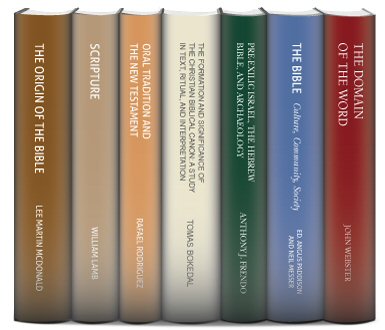
Notably, the top five references are dominated by Revelation, which was non-existent in the systematic theologies classification:
- 2 Peter 1:21 (27x)
- Revelation 11:1 (26x)
- Revelation 11:2 (24x)
- Revelation 22:19 (22x)
- Revelation 3:5; Revelation 22:18 (21x, tied)
Revelation 22:18–19, containing warnings about adding to or taking away from the content of the book, makes total sense here. I’m unsure why Revelation 11:1–2 showed up here; maybe the classifier requires more training data to better discern Bibliology references.
Christology (John 1:14)
With Christology, we have the first instance of the most frequent Biblical theology reference for a topic matching the most frequent systematic theology reference for a topic, John 1:14: “And the Word became flesh and took up residence among us, and we saw his glory, glory as of the one and only from the Father, full of grace and truth.” Christology is, obviously, the doctrine of Christ. Here are the top 5:
John 3:16 is present in both lists (number three in systematic theologies), again reflecting the general dictum that appealing to John 3:16 is usually a good idea.
Pneumatology (John 15:26)
Pneumatology is the doctrine of the Holy Spirit. The most frequent reference is John 15:26 (which is number three in systematic theologies): “When the Advocate comes, whom I will send to you from the Father—the Spirit of truth, who proceeds from the Father—that one will testify about me.” This makes perfect sense to include. But Biblical theologies also include references from Romans 8 and even Joel 2:28 (which is quoted in Peter’s Pentecost sermon, recorded in Acts 2).
- John 15:26 (91x)
- Romans 8:15 (88x)
- Romans 8:9 (87x)
- Joel 2:28 (83x)
- John 14:26 (79x)
Systematic theologies’ most frequent reference, John 14:26, clocks in at number five here.
Soteriology (Ephesians 1:4)
Soteriology is the doctrine of salvation, and both Biblical theologies and systematic theologies seem to agree that Ephesians 1:4 is a great verse to use when discussing the topic: “just as he chose us in him before the foundation of the world, that we should be holy and blameless before him in love.” Note that Ephesians 1:5, which completes the thought of verse 4, is at number four (number five in systematic theologies): “having predestined us to adoption through Jesus Christ to himself according to the good pleasure of his will.” The top five are:
Four of five references match the systematic theologies list. The difference is 2 Timothy 1:9, “who saved us and called us with a holy calling, not according to our works but according to his own purpose and grace that was given to us in Christ Jesus before time began.” Systematic theologies instead include John 3:16, which is generally applicable to all sorts of situations.
Anthropology (Daniel 7:13)
Daniel, Genesis, and John are books commonly referred to when discussing Anthropology (the doctrine of people). The top two Biblical theology references classified in the context of Anthropology are Daniel 7:13–14: “I continued watching in the visions of the night, and look, with the clouds of heaven one like a son of man was coming, and he came to the Ancient of Days, and was presented before him. And to him was given dominion and glory and kingship that all the peoples, the nations, and languages would serve him; his dominion is a dominion without end that will not cease, and his kingdom is one that will not be destroyed.” The top five list:
- Daniel 7:13 (238x)
- Daniel 7:14 (137x)
- Genesis 1:27 (93x)
- Genesis 2:7 (82x)
- John 3:16 (71x)
The Daniel references don’t make much sense to me in the context of Anthropology. I suspect this is due to an inadequacy in the classifier when encountering “man” in the phrase “son of man.”
Angelology (Hebrews 1:5–6)
Apparently the classifier did not find many Angelology references among the Biblical theology resources classified for this dataset. The counts are too low and too scattered to include any significant commentary. My guess is that more training data needs to be generated in order to handle this shortcoming.
However, Hebrews 1:5 and Hebrews 1:6 tied for the top spot, so it’s worth mentioning them here: “For to which of the angels did he ever say, ‘You are my son, today I have begotten you,’ and again, ‘I will be his father, and he will be my son’? And again, when he brings the firstborn into the world, he says, ‘And let all the angels of God worship him’.”
Demonology (Revelation 20:9–10)
As with Angelology, the classifier did not isolate many Demonology references within the specified Biblical theology resources. But two references at the top of the list included Revelation 20:9–10: “And they went up on the broad plain of the earth and surrounded the fortified camp of the saints and the beloved city, and fire came down from heaven and consumed them. And the devil who deceived them was thrown into the lake of fire and sulphur, where the beast and the false prophet also are, and they will be tormented day and night forever and ever. ”
Hamartiology (Romans 5:12)
Romans 5:12 is the most frequent reference in contexts discussing the doctrine of sin (Hamartiology), matching the top spot in the systematic theologies list for Hamartiology. However, the top seven references reflect Romans 5:12–20 (there’s a three-way tie at spot 5).
Here’s Romans 5:12: “Because of this, just as sin entered into the world through one man, and death through sin, so also death spread to all people because all sinned.”
- Romans 5:12 (101x)
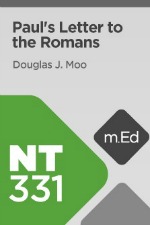
- Romans 5:13 (45x)
- Romans 5:14 (44x)
- Romans 5:18 (38x)
- Romans 5:19; Romans 5:20; Romans 7:7 (36x)
- Romans 5:17 (31x)
- Romans 5:16 (29x)
Romans 5 has long been the go-to spot for discussion of the nature and implications of sin; this appears to have been wholeheartedly picked up by Biblical theologians.
Ecclesiology (Genesis 2:3)
Ecclesiology is the doctrine of the Church. In systematic theologies, the reference most frequently appealed to is Matthew 16:18, a verse about Peter as the rock and foundation of the church.
But perhaps Genesis 2:3 is a bit more foundational, centered on the seventh day of creation: “And God blessed the seventh day, and he sanctified it, because on it he rested from all his work of creating that there was to do.” Here are the other references:
- Genesis 2:3 (67x)
- 1 Corinthians 12:28 (49x)
- 1 Timothy 5:17 (43x)
- Titus 1:7 (39x)
- Acts 20:28; 1 Timothy 3:2 (35x)
From the above references, discussion of Ecclesiology in Biblical theologies appears to focus on roles within the church (overseers, deacons) instead of systematic theologies’ focus on the establishment of the church.
Eschatology (Daniel 12:1)
Eschatology is the doctrine of last things. As with the systematic theology references in eschatological contexts, the frequency numbers of references in Biblical theologies seems anecdotally low.
References for Biblical theologies, however, are focused on Daniel, with Daniel 12:1 the most frequent: “Now at that time, Michael, the great prince, will arise, the protector over the sons of your people, and it will be a time of distress that has not been since your people have been a nation until that time. And at that time your people will escape, everyone who is found written in the scroll.” There is a four-way tie at spot four, and a three-way tie at spot five.
- Daniel 12:1 (39x)
- Daniel 9:27 (36x)
- Daniel 7:25 (23x)
- Numbers 24:5; Daniel 7:14; Daniel 9:26; Daniel 12:2 (19x)
- Isaiah 2:2; 1 John 2:18; Revelation 7:14 (18x)
Systematic theologies seem more focused on Revelation (Revelation 20:4, 10, 12, 14) and Matthew (Matthew 19:28; 25:46) with the obvious candidate, 1 Thessalonians 4:17, included as well. None of these, however, show up as most frequently referenced in Biblical theologies.
Biblical theologies, however, appeal to Numbers 24:5 as an eschatological reference (which is a bit mysterious to me), but Isaiah 2:2 seems well-placed.
Are some Bible books referenced more frequently than others?
With systematic theologies, we saw that early portions of Genesis as well as the Paulines, Matthew, and Psalms were very frequently referenced. How are the references within Biblical theologies distributed? As with systematic theologies, here’s an altogether too small chart representing reference distribution in Biblical theologies:

The order of the bottom axis is the reference according to the Protestant canon, Genesis through Revelation without the deuterocanon/apocrypha. As with systematic theologies, there are hot spots in the beginning of Genesis, Matthew, and particularly the Paulines.
But unlike systematic theologies, there appear to be more frequent spikes throughout the Old Testament material. And there appears to be more relative use of material in the major and minor prophets.
So if you’re writing a Biblical theology, make sure to remember the major and minor prophets — and don’t forget to begin your discussion with Genesis, and support your position with Paul.
Top 100 References Found in Biblical Theology Resources
To finish off this post, here is the list, sorted by popularity, of the top 100 references found in Biblical theology resources. Old Testament passages are in bold so they’re a little more visible when scanning the list.
- John 1:14 796
- Genesis 12:3 785
- Genesis 1:28 751
- Jeremiah 31:33 703
- Jeremiah 31:34 628
- Exodus 34:6 579
- Genesis 12:2 577
- Galatians 2:20 571
- Genesis 1:26 560
- Romans 3:25 550
- Romans 1:4 545
- John 1:1 540
- Romans 8:3 537
- Genesis 1:27 536
- Daniel 7:13 533
- John 3:16 528
- Jeremiah 31:31 515
- Galatians 4:4 513
- Galatians 3:13 510
- Galatians 3:14 505
- John 1:18 504
- Jeremiah 31:32 502
- Exodus 19:6 490
- Romans 1:3 487
- Exodus 34:7 483
- Galatians 3:28 480
- 2 Corinthians 5:17 478
- Psalm 2:7 473
- Genesis 12:1 472
- Galatians 2:16 472
- Psalm 110:1 466
- Matthew 28:19 459
- Acts 1:8 456
- Mark 10:45 452
- Hebrews 1:3 449
- 1 Corinthians 15:3 448
- Matthew 28:20 438
- 2 Corinthians 5:21 436
- Romans 8:29 429
- Galatians 4:6 423
- Exodus 19:5 422
- Romans 3:24 421
- Romans 8:23 415
- Isaiah 42:1 409
- Romans 1:17 408
- John 20:31 404
- Romans 2:29 401
- Hebrews 1:2 397
- Isaiah 61:1 396
- Romans 1:16 396
- Romans 8:11 395
- Galatians 3:10 385
- Galatians 4:5 378
- 1 Corinthians 8:6 374
- Ezekiel 36:26 368
- Isaiah 49:6 364
- Romans 8:15 363
- Daniel 7:14 362
- Genesis 15:6 361
- Romans 8:4 361
- Isaiah 53:12 359
- Romans 3:26 356
- Ezekiel 36:27 353
- Isaiah 2:3 346
- Isaiah 2:2 342
- Romans 11:26 342
- Romans 10:9 340
- Joel 2:28 339
- Galatians 5:6 339
- Galatians 1:4 334
- Romans 4:25 333
- Romans 6:4 326
- Romans 9:5 324
- Galatians 3:26 322
- Romans 3:22 321
- Genesis 3:15 320
- Romans 3:21 317
- John 15:26 314
- Galatians 3:29 314
- Galatians 6:15 313
- Philippians 3:21 313
- 1 Thessalonians 1:10 312
- Romans 5:9 311
- Philippians 2:11 311
- Galatians 3:11 310
- John 20:22 307
- Matthew 28:18 306
- Romans 2:27 306
- 2 Corinthians 5:19 305
- Galatians 3:12 305
- Romans 8:2 304
- Romans 12:2 301
- Philippians 3:9 300
- Colossians 1:16 297
- Romans 2:28 296
- Romans 3:20 296
- Romans 2:26 295
- Galatians 3:27 295
- Mark 1:15 294
- Galatians 3:22 294
See any interesting connections or implications? Keep the discussion going in the comments.
And check out these two great articles on Biblical theologies:
- 10 Fascinating Questions Answered by Biblical Theology
- 3 Ways Biblical Theology Will Change Your Bible Study
 Rick Brannan is the general editor of the Lexham English Septuagint and the translator of The Apostolic Fathers in English. He also translated and edited Greek Apocryphal Gospels, Fragments, and Agrapha. He is author of the New Testament portion of the Lexham Textual Notes on the Bible. He recently published Lexical Commentary on the Pastoral Epistles: First Timothy and Second Timothy: Notes on Grammar, Syntax, and Structure. He is currently working on the Second Timothy volume for the Lexical Commentary on the Pastoral Epistles as well as a discourse analysis of the Pastoral Epistles. His personal web site is RickBrannan.com; you can follow him on Twitter at @RickBrannan.
Rick Brannan is the general editor of the Lexham English Septuagint and the translator of The Apostolic Fathers in English. He also translated and edited Greek Apocryphal Gospels, Fragments, and Agrapha. He is author of the New Testament portion of the Lexham Textual Notes on the Bible. He recently published Lexical Commentary on the Pastoral Epistles: First Timothy and Second Timothy: Notes on Grammar, Syntax, and Structure. He is currently working on the Second Timothy volume for the Lexical Commentary on the Pastoral Epistles as well as a discourse analysis of the Pastoral Epistles. His personal web site is RickBrannan.com; you can follow him on Twitter at @RickBrannan.
Rick manages the Content Innovation department at Faithlife, a team focused on original language analysis, reverse interlinear textual alignments, and creation and analysis of Bible data. He lives in Bellingham, WA with his wife, Amy, and their children Ella, Lucas, and Josiah.


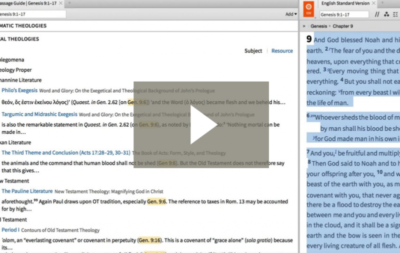
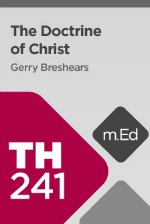





I find it very peculiar that in soteriology (both biblical and systematic, apparently, since they are said to match up fairly well in this case) that the top five passages are all Reformed-Calvinist favorites discussing predestination and election. I suspect that most of these theologies are written from (or reacting against) this theological persuasion in Logos’s collection. What ever happened to Romans 10:9-13 and other verses that discuss the necessity of faith in order to be saved? From this list one might get the impression that Christians believe that a person just sits back and does nothing about his or her salvation, not even respond in faith to Christ!
Hi BJ. That’s a great observation. The data is necessarily reflective of the corpus of resources/books evaluated. The systematic theologies evaluated are listed (and categorized) here: https://rickbrannan.com/2017/06/09/list-of-systematic-theology-resources-used-in-my-thelab-blog-post/ . As you can see, it does skew toward a reformed and presbyterian perspectives.
I’d say that even if a text approaches soteriology from a non-Reformed perspective, it probably needs to interact with the references used to support the Reformed perspective, and that may be reason for the prevalence of those particular references (to the exclusion of the others).
First of all, Thank You Mr. Brannan for sharing the insight the LORD gave you.
It is too often that our fellow believers, although well meaning, make basic errors when attempting to express their thoughts concerning our Redeemer. As Paul wrote, I am chief among sinners when it comes to this. Try as I might, my words fall far short in describing my relationship with Him. So, I am in complete agreement with all fellow believers and theologians in expressing dismay in the omission of Exodus 34:6–7. In truth, “dismay” is completely inadequate in describing the reaction.
Think for a moment about the speaker and what He said. The speaker is the LORD Himself, and He is describing Himself. He and He alone is capable of telling the truth concerning Himself. As the TV commercial says, “It doesn’t get any better than this.”
The failure of anyone to include this verse shows the failure of pastors, teachers, churches, institutions of higher learning, etc. concerning one of the great truths of all education: “You can’t understand, much less pass, the 201 level of any course if you do not understand the 101 level.”
Regrettably, the words and teachings found in the Torah, or Old Testament if you prefer, are not studied sufficiently, at ALL levels. We must go back to the beginning of the LORD’s revelation of Himself if we truly wish to try to understand Him.
As I close, I wish to add one final statement: All of Eternity will be insufficient to completely understand the LORD.
Thank you.
That is really interesting, You’re an excessively professional blogger. I’ve joined your rss feed and stay up for looking for extra of your magnificent post. Additionally, I have shared your site in my social networks
I am sure this piece of writing has touched all the internet viewers, its really really nice article on building up new blog.
[…] Brannan has followed up at theLAB with the promised corresponding analysis for biblical theologies. This new analysis comments in […]